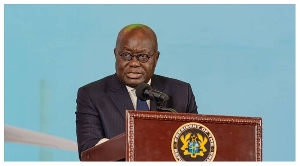Opinions of Sunday, 2 December 2007
Columnist: Okoampa-Ahoofe, Kwame
Raising Storms in Teacups
This is the second time within a month that I am being forced to issue a riposte to dastardly attempts by P. Y. Tsikata to gratuitously inflame passions over the Anlo chieftaincy crisis. The gender of the writer, to-date, remains a mystery to yours truly; I can only presume from the querulous and intemperate tone of the writer’s articles that P. Y. Tsikata may be a man – for stereotypically speaking, Ghanaian women, those of sound mind, of course, tend to be relatively more measured and rational in cases of this nature than many of their menfolk. Maybe the explanation lies somewhere between maternal instincts and emotional fortitude. I am only surmising, mind you.
In sum, P. Y. Tsikata’s article, sensationally titled “A New Twist to the Anlo Murders” (Ghanaweb.com 11/25/07), offers absolutely nothing worth the reader’s while on the issue, save the shameless exhibition of the crass ignorance of the way and manner in which crimes – and criminal activities – are investigated.
The author’s attempt to impugn the credibility of the Ghana Police Service (GPS), merely because the latter’s Criminal Investigations Department (CID) has aptly undertaken to relocate the bodies of the victims of the Anloga clashes for autopsy – or postmortem examination – is rather sophomoric. Which law-enforcement agency, for instance, did P. Y. Tsikata expect to take over the autopsy on the afore-referenced victims, other than the Ghana Police Service? Couple the preceding with the fact of the GPS being specially equipped to conduct forensic autopsy on criminal exhibits, or specimens, and Tsikata’s complaint falls flat on its prats.
Then also, its constitutes the very height of cynicism for the “onlooker-plaintiff” to presume that just because some police personnel were allegedly involved in the Anloga shootouts, necessarily translates into prejudicial forensic evidence. Were such trend of reasoning valid, then, perforce, the complainant ought to have called for the invitation of foreign investigators to conduct the autopsy, rather than shrilly and pointlessly calling for an unspecified “independent body” to take over the investigations. And fifty years into postcolonial sovereignty, what would the latter be saying about our half-century’s assertion of sovereignty? And just who said every loudmouthed Ghanaian is an intelligent Ghanaian?
It is also rather amusing and sophomoric for Tsikata to be insisting that “all the parties to the dispute [ought to have been] invited [to the morgue] before the bodies of the deceased [were] removed for any examination to determine the cause[s] of death[s].”
Somebody needs to inform Tsikata that unless the identities of the deceased were in serious doubt, there was absolutely no reason, and/or need, for the police and, or, forensic experts to have invited the families of the deceased into this purely scientific and highly sensitive process. The only exception here, however, is that if family members of any of the deceased wanted to have private forensic experts, of their own hiring, involved in the process, then, of course, the Police would have been legally bound to observe the same. As it stands, there is absolutely no evidence, even from Tsikata’s own article, indicating that the preceding situation preexisted the removal of the bodies of the deceased pending forensic examination. In sum, did any of the members of the bereaved families inform the police, shortly after the latter took possession of their deceased relatives’ bodies that they wanted to be made an integral part of the investigative process and on what terms?
In essence, once the law-enforcement agency of the Ghana Police Service took over the exhibits or pieces of evidence relevant to the Anlo chieftaincy clashes, such evidence forthwith became the property of the Ghana Government, until such time that the Police, acting on behalf of the Government, determined that such criminal, or forensic, evidence was no longer needed for judicial purposes – either upon the conclusion of criminal prosecution of the alleged culprits, or suspects, involved, or the conclusive determination that the deaths of the victims were purely accidental and that no criminal charges, whatsoever, would likely be filed.
As a reporter, it is a gaping travesty for Tsikata to be asking the following question, having been apprised of the fact of Mr. Raymond Okudzeto, a distinguished Ghanaian politician, human-rights activist and lawyer, having been in the know, as it were, prior to the removal of the bodies of the Anloga victims: “[I]s Mr. Raymond Okudzeto a family member of any of the deceased and is it true that he is in the known [sic] of [sic] the removals?”
Who and/or what prevented P. Y. Tsikata from directly contacting Mr. Okudzeto, in order to receive the relevant and necessary answers to the questions that he has rather facilely chosen to obliquely pose to his readers? From the preceding question by Tsikata, the critical reader learns something quite interesting and instructive. P. Y. Tsikata is very likely not related to any of the victims of the Anlo chieftaincy clashes. And so why is the writer so hell-bent on prejudicing his audience against the most democratic, justice-loving and progressive government of postcolonial Ghana, except to desperately and ineffectually attempt to make a bonfire out of smoldering cigarette butts?
Then again, why characterize the bodies of the victims of the Anloga mayhem as “missing,” when even reporter Tsikata himself also claims that personnel of the Ghana Police Service have removed the same, for the significant and express purpose of forensic autopsy? Or is this just another pathetic case of the reporter being linguistically too challenged for his own good as well as that of his readers?

Views expressed by the author(s) do not necessarily reflect those of GhanaHomePage.












